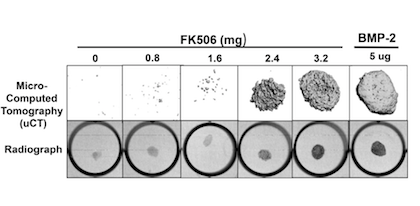The transplant immunosuppressant drug FK506, also known as tacrolimus or Prograf, can stimulate bone formation in both cell culture and animal models. This info comes from orthopedics researcher Nick Willett, PhD and colleagues, published in International Journal of Molecular Sciences (open access).

Nick Willett, PhD
The results suggest that FK506 might be repurposed as a “stand-alone” replacement for recombinant BMP-2 (bone morphogenic protein 2). That product has been a huge commercial success for Medtronic, in the context of spinal fusion surgeries, although controversial because of cost and side effects.

BMP-2 is more potent gram for gram, but FK506 still may offer some opportunities in local delivery. From Sangadala et al (2019)
One of Willett’s co-authors is orthopedics chair Scott Boden, MD, whose lab previously developed a system to search for drugs that could enhance BMP-2. Previously, other researchers had observed that FK506 can enhance the action of BMP-2 – this makes sense because FK506’s target protein is a regulator of the BMP pathway. Willett’s team used FK506 on its own, delivered in a collagen sponge.
“That is the big finding here, that it has the potential to be used on its own without any BMP-2,” he says.
The sponge is a possible mechanism for getting the drug to tissues without having too many systemic effects. Willett’s lab is now working on refining delivery, dosing and toxicity, he says.
Willett, based at the Atlanta VA Medical Center, is in the Department of Orthopedics and the Wallace H. Coulter Department of Biomedical Engineering at Georgia Tech and Emory. He and Sree Sangadala, PhD (first author of the IJMS paper) currently have a grant from National Center for Advancing Translational Sciences on this project.




